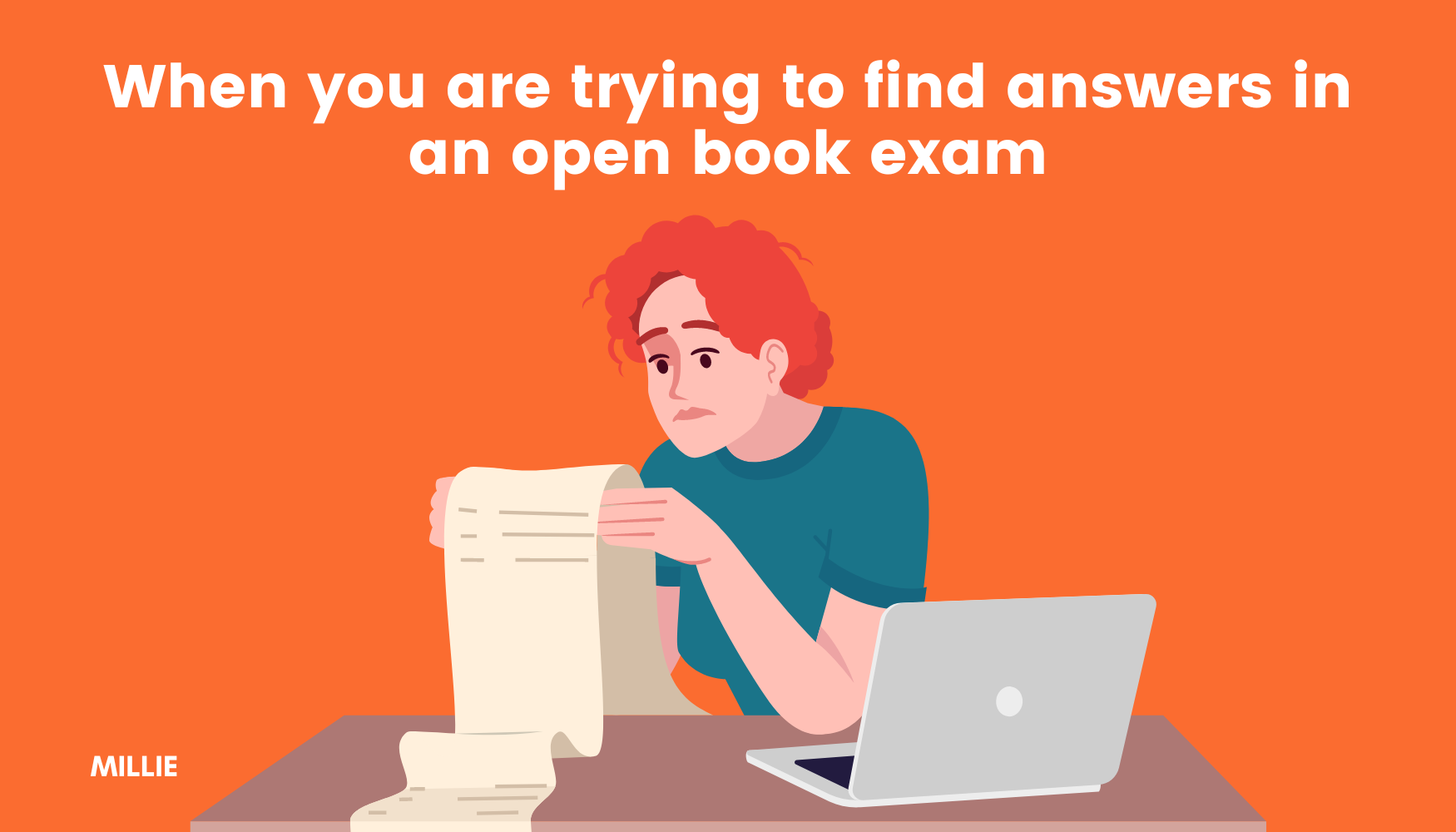How to Prepare for Open vs. Closed Book Exams
The pandemic undoubtedly changed the way we learn, one of the key changes being online open-book exams. But should you prepare for an open-book exam the same way you’d prepare for a traditional closed-book exam? To answer this question, Millie’s broken down everything you need to know about preparing for open vs closed-book exams!
You’re sitting in a massive exam hall at a desk barely big enough to fit your exam paper, with the exam clock ticking ominously. Yeah, taking official closed-book exams is intimidating. But for some highschools across the world and lots of universities, this is how your closed-book exams will be! And most of us have our own tried-and-tested methods to prepare for them. But the pandemic has now made open-book online exams much more popular! And like other online forms of learning, it’s a trend to stay. Going forward, you’ll need to know how to prepare for open-book exams as well as closed-book, so read on to find out exactly how!
First up, what are open-book exams?
“Don’t make the mistake of believing open-book exams are easy”
If your exams got cancelled during the pandemic, there’s a good chance you’ve never actually had to take an open-book exam. So for all of you out there, let’s first explain what it is. An open-book exam is - as indicated in the name - an exam where you can have your textbooks open in front of you. Be sure to check exactly what resources you’re allowed to access during the exam, but typically you can use any resources you’d like (this means textbooks, study notes and the internet). In other words, everything except actual people (unfortunately, collaborating with your friends is still cheating)!
But wait, that sounds easy right? Why would you even need to study? Don’t make the mistake of believing open-book exams are easy and don’t require studying. That’s exactly where students lose points. Examiners know that accessing material during the exam makes it easier, so they adjust the question style and time limit accordingly. Trust us, open-book exams are not a breeze.

Online open-book exams
Open-book exams are usually held online, and can be taken from anywhere you’d like. For essay based answers, taking the exam is easy enough, as you simply type your essay into the exam document and submit it. But for subjects like maths or physics, where you need to write out calculations and formulas, it gets a bit trickier.
Most softwares like Microsoft Word or Google Docs have equation editors that allow you to input complex equations into your text (practice using these before your exam)! But if you have lengthy calculations, this isn’t always practical. For some exams, you will be allowed to write your answers on paper, and then upload a scan of this to the exam portal. Your school or university will give you guidance on how to upload these images, so make sure you practice doing this to avoid last minute exam stress! The worst feeling is completing an exam but not being able to upload it in time…
Ok I get it, now how do I prepare for them?
Given the different format of open-book exams vs closed-book exams, they have a very different way of preparing for it. Let’s break it down.
Preparing for the exam
With closed-book exams, we’re used to making thorough study notes, reviewing them multiple times over with your flashcards and study buddies, and eventually turning up to the exam knowing (hopefully) everything you’ll need. But it’s a little different for open-book exams.
“Open-book exams especially rely on having study notes that are clearly laid out and easy to read”
- Ideally make study notes on the laptop or iPad - This allows you to use the search function for key words in the question to find the exact section in your notes, and avoids you flipping through pages of written notes to find something

- Tidy notes are key - While it’s important to have good study notes for any exam, open-book exams especially rely on having study notes that are clearly laid out and easy to read. For more tips on making great study notes, check out our article on making the best study notes to ace your exams!
- Familiarise yourself with the exam software - Whether this is practising fast typing, using equation editors, or having all of the relevant online resource tabs open on your laptop, make sure you don’t need to be looking for things in the exam. You should only have to focus on answering the questions, not looking for resources. Making a resource list is a great way to have all your material in one place to refer to!
- Cheat sheets and definition pages - Since you don’t want to waste time going through your notes in an open-book exam, having a few cheat sheets and definition pages with the key concepts will make you much faster in answering questions and finding exactly what you need
- Understand the concepts - Open-book exam questions are written in a way that doesn’t just allow you to find answers in the textbook (c’mon, that would be too easy)! Most questions will ask you to apply your knowledge, meaning you’ll have to know the content and be able to explain it without solely relying on the textbook. That being said, you can get away with not completely memorising definitions or short formulas that can be copied down from your notes, so you can spend your time understand more complex concepts that you’ll need to apply with the help of your textbook or study notes
Taking the exam
In some ways, it’s easier to sit through a closed-book exam as you don’t need to worry about flipping through your notes and it’s much easier to focus given you’re in an exam environment. The experience of taking an open-book exam is a little different, especially if they’re online.
“Don’t use the upload time as extra exam time”
- You’re in charge of your workspace - This means finding a quiet area where you won’t be disturbed and where you can work well. It also includes having all your study material easily accessible to you to use during the exam!
- Keep track of time - There’ll be no invigilator telling you when you have 30 minutes left or time to upload, so you’ll have to keep on top of timing yourself! Setting various timers through the exam (even setting timers for individual questions) is a great way to check yourself and make sure you are not falling behind on time
- Don’t get distracted! - If you’re sitting in your room doing an exam, it’s very easy to get distracted and start zoning out on other things, simply because you’re not used to doing an exam in such a relaxed environment! Try to consciously remind yourself that you’re in exam conditions, which means 100% concentration right through the exam. Just imagine you’re in the actual exam hall. Would you still take 5 minutes to check your phone or respond to messages?
- Keep enough time to upload - You will usually be given a designated upload period to scan your answers and upload them to the exam document, but again, nobody’s checking whether you are still writing your answers during this time or using it to upload! Take it from us, uploading takes longer than you might expect. So don’t use the upload time as extra exam time. Give yourself enough time to scan your answers, upload them, check for image clarity, and check the final document to upload.
- Don’t plagiarise - This is an EXTREMELY important point. Given that you’re using class material and textbooks in open-book exams, it is essential that you source any material that is not your own, to avoid plagiarism. It’s not often something we think about in exams (since it’s not an issue in closed-book exams) but it can cause some massive complications for open-book exams. Always reference your work to avoid this happening!
Mythbusting open-book exams
“You really do need to revise for open-book exams”
Myth #1 - Open-book exams are easy
While for many students, open-book exams are far less stressful than sitting in an intimidating exam hall, open book exams are by no means easier. The exam is tailored to make sure having your notes in front of you isn’t an advantage. In many ways, closed-book exams are easier to answer, as you can find most answers in the textbook (meaning you can almost memorise entire answers)! With open-book exams, you’ll have to learn the textbook material, and then be able to apply it yourself to other situations asked in the question. This requires a much deeper level of understanding.
Myth #2 - You don’t need to study for open-book exams

Like we said, the level of understanding required for open-book exams is much more than for closed-book. While you can have your notes out, you absolutely do NOT have the time to start reading the textbook and trying to understand concepts during the exam. Even for simple definitions, you should know the gist of it beforehand, and only do very quick checks during the exam using your notes. So yes, unfortunately, you really do need to revise for open-book exams.
Myth #3 - Upload time is just extra exam time
This is such an important misconception that we’re repeating it here. Do not use your upload time to answer questions! If you’re given time to upload, that means you need that much time to upload. Giving yourself only the last five minutes to do this runs the risk of not being able to upload in time and losing significant marks. (And examiners won’t allow the excuse that you ran out of time, and accept an emailed version of your responses).
Now you know how to prepare for open book-exams as well as closed-book! As long as you don’t make the common mistakes of underestimating open-book exams, and prepare organised study notes, you’ll be on track to ace all your exams! For more guidance on exam preparation, sign up for a free consultation with Millie!